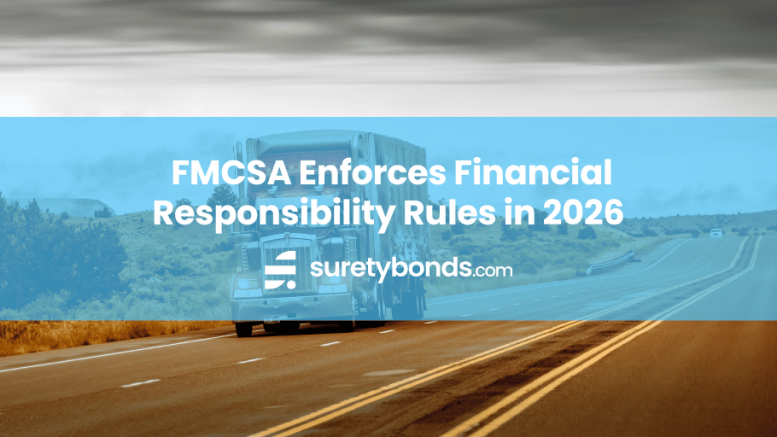Are you compliant with the 2026 freight broker financial responsibility provisions? After a two-year grace period, non-compliant brokers and forwarders will now begin being suspended if their BMC-85 trust funds are not approved.
What You Need to Know
Starting January 16, 2026, the Federal Motor Carrier Safety Administration’s (FMCSA) new rule adds stricter financial security and compliance requirements for freight brokers and forwarders, especially in regards to BMC-85 trustee and asset options.
Key Updates: Up to 90% of trustees won’t qualify, and acceptable BMC-85 trust fund assets are now limited to cash, U.S. Treasury bonds, or federally-insured irrevocable letters of credit.
Who’s Affected: All United States freight forwarders and freight brokers regulated by the FMCSA
Purpose: To ensure adequate funds are available to cover unpaid freight charges or claims
Final Compliance Deadline: January 16, 2026
Reason for Updates
Prior to 2024, many BMC-85 trust providers were using illiquid assets that did not protect clients and claimants if a broker went out of business. This, paired with inadequate federal oversight created fraud and financial issues within the U.S. freight forwarding industry.
In recent years, the FMCSA has begun to set more guardrails and enhance regulations, including this rule. It technically went into effect on January 16, 2024, but the FMCSA extended the final compliance date to January 16, 2026. Brokers, forwarders and financial providers alike must meet all new provisions by then to avoid repercussions.
5 Key Provisions for BMC-85 and BMC-84
The 2026 FMCSA rule contains 5 key provisions for freight broker and forwarder financial security and regulation:
- Fewer BMC-85 asset options
- Stricter BMC-85 trustee options
- Suspension of operating authority
- New financial failure responsibilities
- Greater FMCSA oversight
We’ll break down each of these key updates below.
#1 – Fewer BMC-85 Asset Options
The only assets FMCSA now accepts for freight broker financial responsibility are:
- Cash
- Irrevocable letters of credit (ILOC)
- U.S. Treasury bonds
ILOCs must be issued by FDIC-insured depository institutions. Any other asset types that don’t meet MAP-21 criteria will not be accepted. This will ensure all assets are readily available with high liquidity.
#2 – Less BMC-85 Trustee Options
Formerly, lenders and finance companies could be BMC-85 trustees. Under the new rule, loan and finance providers are not eligible to serve as trustees because they do not meet the liquidity and safety standards offered by federally-insured institutions.
Only the following types of federally-regulated financial institutions can serve as trustees:
- Federally-regulated trust companies
- FDIC-insured banks
- NCUA-regulated credit unions
#3 – Suspension of Operating Authority
Trustees and surety providers are now required to notify the FMCSA if the freight broker’s financial security drops below the $75,000 threshold for more than 7 days. The FMCSA then has the authority to freeze or suspend operating authority immediately.
Formerly, there was a 30-day grace period to correct drawdowns or judgments that lowered the security. Automatic non-compliance reporting gives the FMCSA greater oversight and control of the disbursement process and timeline.
#4 – Financial Failure Responsibility
Freight brokers and forwarders are not considered insolvent after filing Title 11 bankruptcy. There are new guidelines for surety companies and financial institutions to follow, along with the FMCSA, if they recognize a broker or forwarder is facing financial failure or insolvency.
These changes outlined in the new rule intend to expedite the claims process, clarify roles and timelines, and provide greater protection for claimants.
#5 – Greater FMCSA Oversight
On the financial provider side of things, new penalties give authority for the FMCSA to suspend surety bond or trust providers who are not compliant with regulations.
It also increases the severity with both a monetary penalty and a mandatory three-year probate period in which the entity cannot provide financial security to freight brokers.
Is It Better to Get a BMC-84 Bond or BMC-85 Trust in 2026?
According to Title 49, U.S.C. 13904, all freight brokers must file either a BMC-84 surety bond or BMC-85 trust. Both are approved financial security options for freight brokers to obtain a license.
With a BMC-85 trust, you must deposit the full $75,000 collateral in addition to a fee. For a BMC-84 bond, you pay an annual credit-based premium starting at $938 with no collateral.
Fewer Trustee Options Are Likely to Increase Costs
Under the new 2026 rule, up to 90% of BMC-85 trustees will no longer qualify. These providers will either become ineligible or will need to become federally-insured and compliant to meet the new standards.
This is expected to result in higher trustee fees, making the BMC-85 trust a costlier option than the surety bond for most brokers.
If you’re still unsure which option is best for you, read more about the pros and cons of BMC-85 trusts versus BMC-84 surety bonds here.
How to File Your FMCSA Financial Security
The FMCSA now requires electronic submission of all information from the surety company or trust provider. They will electronically file your proof of financial responsibility with the FMCSA on your behalf.
You can verify your FMCSA authority and BMC-85 trust status at any time. Find more information about FMCSA insurance filing requirements here.
Next Steps
So, what should you do next? Act now — don’t risk suspension of your operating authority!
Take these next steps to make sure your FMCSA financial requirements are all set for 2026:
- Convert to qualifying assets. Swap any non-qualifying assets in your trust fund with qualifying 7-day liquid financial instruments.
- Review current trustee coverage. If you currently have a BMC-85 trust with a loan or finance company, switch to a surety bond or a qualified trustee by January 16, 2025.
- Cancel former trust. If no longer eligible or best for you, cancel the old trust after the new financial requirement is filed with FMCSA. File the BMC-85 Notice of Cancellation form.
If you need any help navigating the process of switching to a BMC-84 bond, call our surety experts at 1(800)308-4358.
